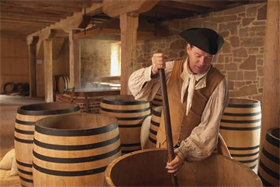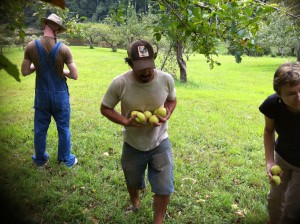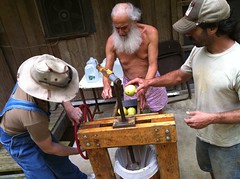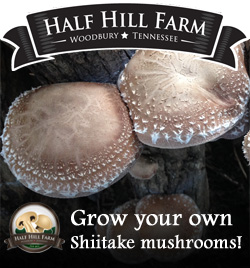The role of distilleries in our rural way of life
The Sanbourns told us we were welcome to pick as many apples as we wanted from their small Short Mountain orchard.
Like most homeowners, the Sanbourns grow them organically and couldn’t possibly eat everything their orchard produces. Mrs. Sanbourn told us about the only thing appreciating them lately were the deer, so she was happy to see us put them to use.
After a couple of hours of picking we ended up with about seven bushels of apples. They were a mix of Yellow Delicious and a hybrid they called “Johnny” Delicious. If we had time, we probably would have gotten more, but we had to meet up with Gabby by 2 p.m. if we wanted to use his apple press.
In the old days, this is how cider and distilled brandy was made. The process was often a collective effort by locals that extended the life of fruit well into the winter, warming the farmer, making holiday cheer and soothing mild winter ailments.
In the late 1800s, residents throughout Cannon County would bring their apples to Jim Jamerson who ran a legal distillery near Burt. “Jimerson” would then turn the collected apples into brandy. Jamerson was just one of several enterprising distillers in Cannon County who created sustaining value for the community’s rural way of life. It was an American way of life that made friends out of neighbors and let nothing go to waste.
 Distilleries have always been a part of American culture. Nearly every single one of our founding fathers distilled spirits, and one of the first taxes they levied on the American people to pay for war and to build our nation was the Whiskey Tax.
Distilleries have always been a part of American culture. Nearly every single one of our founding fathers distilled spirits, and one of the first taxes they levied on the American people to pay for war and to build our nation was the Whiskey Tax.
You don’t have to look too far back into Tennessee’s history to understand the role distilleries played in making farms successful and building our great state.
In 1840 the U.S. Census reported that Cannon County alone had 18 distilleries. Distilling spirits was a necessary way to turn grain into a medicinal and dietary staple of rural family life.
In an 1874 letter to Tennessee’s Secretary of Agriculture J.B. Killebrew, Robertson County attorney William Moore described how distilleries in his county kept local farms profitable.
The immense amount of grain required in the manufacture of the article has stimulated the farming community to produce more corn, there being an active and steady demand for it at the highest and most remunerative prices. Seven hundred and fifty bushels of grain are being daily consumed, (which would be forty-five thousand barrels annually). This will give some idea of the immense business. The increasing demands for grain have absorbed the entire surplus of corn in the county, and have compelled our distillers to rely in a great degree upon the St. Louis and other foreign markets, including the productions of the rich Wabash Valley.
Since 1900, Cannon County’s population has gained just a few hundred people. In many ways, we still embrace an agrarian lifestyle. In his 1874 report The Resources of Tennesseee, Sec. Killebrew had this general observation of the people of Cannon County.
The citizens are industrious and energetic, but not enterprising. They prefer the old way because they believe it to be the sure way. They are greatly attached to the county, and emigration to other states is very rare. They would like to have additions to their population, though labor is sufficiently abundant and cheap. The county is free from debt, and jury tickets are at par. Infractions of the law are not common. Ease, peace and plenty characterize the county. Economy is the ruling trait of the citizens, and they mingle with their labors many of the pleasures of life.
Life in Cannon County has strayed little from that quaint description from 136 years ago. About the only noticeable exceptions are jobs, revenue and the quality of life both sustain.
The opportunity we have to preserve our way of life is tucked between our rolling hills and pages of history’s wisdom. It comes in bushels of corn, rye, sorghum, and maybe even apples, all grown here for over 100 years. And with your support in November, our values and our heritage can be our most treasured export to the world.









